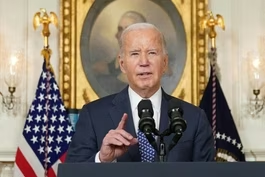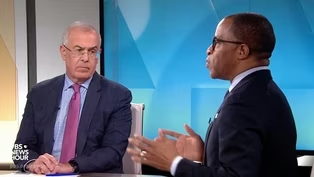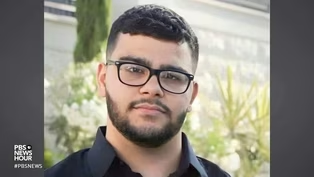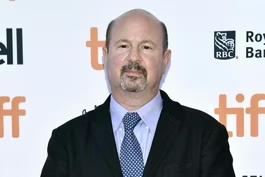
Why governors rejected food assistance program for children
Clip: 2/9/2024 | 6m 15sVideo has Closed Captions
Why some governors turned down a food assistance program for children in their states
A new federal food assistance program is aiming to reduce child hunger by giving low-income families money for summer groceries. But only those who live in certain states will have access to that relief. John Yang explains.
Problems playing video? | Closed Captioning Feedback
Problems playing video? | Closed Captioning Feedback
Major corporate funding for the PBS News Hour is provided by BDO, BNSF, Consumer Cellular, American Cruise Lines, and Raymond James. Funding for the PBS NewsHour Weekend is provided by...

Why governors rejected food assistance program for children
Clip: 2/9/2024 | 6m 15sVideo has Closed Captions
A new federal food assistance program is aiming to reduce child hunger by giving low-income families money for summer groceries. But only those who live in certain states will have access to that relief. John Yang explains.
Problems playing video? | Closed Captioning Feedback
How to Watch PBS News Hour
PBS News Hour is available to stream on pbs.org and the free PBS App, available on iPhone, Apple TV, Android TV, Android smartphones, Amazon Fire TV, Amazon Fire Tablet, Roku, Samsung Smart TV, and Vizio.
Providing Support for PBS.org
Learn Moreabout PBS online sponsorshipAMNA NAWAZ: A new federal food assistance# program is aiming to reduce child hunger by## giving low-income families money# for summer groceries.
But only## those who live in certain states# will have access to that relief.
John Yang explains.
JOHN YANG: Many children who qualify for# free or reduced school lunches would lose## that benefit when the school year ended.
But# now a new program aims to bridge that gap by## giving needy families $40 a month for each child# who's eligible while the school is not in session,## money to buy food at grocery stores,# farmer's markets, or other approved outlets.
It's called Summer EBT, for Electronic Benefits# Transfer, because the money is electronically## loaded onto cards like debit cards; 35 states have# signed up for the program, aiding an estimated 21## million children.
But 15 other states have said# no, excluding about eight million children.
Crystal FitzSimons is director of child nutrition# programs for the Food Research and Action Center,## an advocacy group that works to# reduce poverty-related hunger.
Crystal, how big a problem# is it for needy families to## lose that benefit when school's not in session?
CRYSTAL FITZSIMONS, Food Research and Action# Center: Yes, well, so we have millions of## families who rely on free and reduced-price# school lunch during the sc.. And when the school bell rings, they lose# access to those meals.
And during the summer,## we see an increase in food insecurity.# We see kids gaining more weight.
And## there's just a tremendous amount of# stress on families when they need to## replace those breakfasts and lunches that# they could rely on during the school year.
So it's a huge hardship.
And the# summer EBT program, like you said,## is just an amazing new opportunity to make sure# that kids are not going hungry during the summer.
JOHN YANG: Before this program, was there any way# for children to get free or reduced-price lunches?
CRYSTAL FITZSIMONS: Well, we# have the summer meals program,## and that will continue.
And in a lot of# ways, it's an amazing program.
Often,## it combines activities and enrichment# for kids, along with the meals.
But it served only a fraction of# the kids who relied on free and## reduced-price school meals during# the school year.
And, as a result,## we saw food and security go up.
So, Summer EBT# really is designed to kind of bridge that gap.
JOHN YANG: And in the other programs,# they'd have to go to a location,## rather than have the money# go directly to the parents.
CRYSTAL FITZSIMONS: That's exactly right.
So it's great when there is a site in the# community, a.. are going to be able to pick up meals too# in rural areas this summer.
But Summer EBT## really is kind of the easiest way to get# resources to families to purchase food.
JOHN YANG: The 15 states that# opted out of this program,## what reasons did they give for doing that?
CRYSTAL FITZSIMONS: So there were a lot# of reasons, and they can come into the## program in 2025.
So the door is open, and# we really encourage them to consider it.
But it is a relatively new program, and so states# are implementing it for the first time this## summer.
And so some states just needed a little# more time.
States also have to provide 50 percent## of the admin costs.
And so it's taking states# a little bit more time to figure out where that## money is coming from.
But we are hopeful that,# by 2025, all the states will be in the program.
JOHN YANG: Did some governors have# philosophical differences with this?
CRYSTAL FITZSIMONS: Well, there were# a couple of governors who did come## out and express concerns about# the program, Iowa and Nebraska.
But we are hopeful that when they take another# look at the program, they will reconsider it,## because some of the things that they said, like# that it was a pandemic era program, really,## that's just not true.
We have had an issue with# summer hunger since I have started working at FRAC## 25 years ago.
And it continues every summer# when families lose access to those meals.
So, hopefully, in 2025, those states# will actually take advantage of this## tool to make sure that the kids in# their state aren't going hungry.
JOHN YANG: But, for this summer, there# are 15 states that have not -- that## opted out.
You have millions of# children beyond the reach of this## program.
What are your concerns# and worries about those children?
CRYSTAL FITZSIMONS: Well, the concern is that food## insecurity will go up again in# those states during the summer.
But we do encourage families to access# the summer meals program.
Those are## still available in those states.
And they do# provide an important resource for families.
JOHN YANG: One of the governors who said no was# Governor Kim Reynolds of Iowa.
She said that,## rather than creating a new program with# what she said would be a new bureaucracy,## she thought the administration should give the# state's flexibility under current programs,## so they could do this on their own.
What do you say to that?
CRYSTAL FITZSIMONS: Well, I would say# that the Summer EBT program .. that has been piloted for more than a# decade.
And the pilots have shown that## food insecurity goes down when families# have access to it and nutrition goes up.
So it's not -- it is technically a new# program, in that it is available to all## states nationwide this summer, but it# has been piloted because we knew that## there was a problem during the summer, and# Congress did act about 10 to 12 years ago to## actually pilot it.
And those evaluations# just show what an amazing program it is.
JOHN YANG: Earlier, you said# that, during the summer,## children gain weight.
Is that# because they're eating unhealthily?
CRYSTAL FITZSIMONS: During the summer, kids lose# access to free and reduced-price school meals,## which do have nutrition standards and do provide# some of the healthiest meals that kids are eating.
And so, during the summer, kids can be less# active.
I know a lot of people think that kids## are out at the park and we have these visions# of what it's like for the summer for kids,## but they may be less active.
And then, if families# are struggling to put food on the table, if you## provide more resources to them, then they're# likely going to spend it on healthier food too.
JOHN YANG: Looking more broadly# beyond just children, schoolchildren,## where do we stand on food insecurity now in# this country for just the general population?
CRYSTAL FITZSIMONS: Yes.
Well, so, ..
It continues to stay with us.
And there# are a lot of ways to combat it.
But one## of the easiest ways to combat it is to give# families more resources to purchase food.
JOHN YANG: Crystal FitzSimons of the Food# Research and Action Center, thank you very much.
CRYSTAL FITZSIMONS: Great.# Thank you for having me.
Biden pushes back on criticism of his mental fitness
Video has Closed Captions
Clip: 2/9/2024 | 5m 12s | White House pushes back on special counsel's criticism of Biden's mental fitness (5m 12s)
Brooks and Capehart on voters' concerns about Biden's age
Video has Closed Captions
Clip: 2/9/2024 | 10m 52s | Brooks and Capehart on voters' concerns about Biden's age, Trump's ballot eligibility (10m 52s)
Father of Palestinian American teen discusses son's death
Video has Closed Captions
Clip: 2/9/2024 | 6m 27s | Father of Palestinian American teen killed in West Bank discusses son's death (6m 27s)
Kwame Alexander discusses his anthology of Black poetry
Video has Closed Captions
Clip: 2/9/2024 | 7m 8s | Kwame Alexander discusses his anthology of Black poetry, 'This Is the Honey' (7m 8s)
Legal case highlights conservatives' attacks on science
Video has Closed Captions
Clip: 2/9/2024 | 6m 39s | Million-dollar legal victory shines light on conservatives' attacks on science (6m 39s)
Netanyahu orders military to plan for Rafah evacuation
Video has Closed Captions
Clip: 2/9/2024 | 5m 8s | Netanyahu orders Israeli military to plan for evacuation of Rafah ahead of ground assault (5m 8s)
Providing Support for PBS.org
Learn Moreabout PBS online sponsorship
- News and Public Affairs

FRONTLINE is investigative journalism that questions, explains and changes our world.

- News and Public Affairs

Amanpour and Company features conversations with leaders and decision makers.












Support for PBS provided by:
Major corporate funding for the PBS News Hour is provided by BDO, BNSF, Consumer Cellular, American Cruise Lines, and Raymond James. Funding for the PBS NewsHour Weekend is provided by...





